Understanding Mumps: What You Need to Know
Mumps—while the name might sound unusual, it's a disease that has significantly influenced public health discussions over the decades. Though it's less common today due to effective vaccination programs, understanding what mumps is and how it affects us remains crucial. Whether you're concerned about contagious diseases or simply expanding your knowledge, this guide covers all aspects, from symptoms to prevention.
What Are Mumps?
Mumps is a contagious viral infection primarily known for causing painful swelling of the salivary glands, particularly the parotid glands located near your ears. This distinctive swelling results in the characteristic puffy cheeks and a tender, sore feeling in the jaw area.
A Brief History of Mumps
Historically, mumps had a significant impact on children and adults alike. Before the vaccine's introduction in the late 1960s, mumps was one of the common causes of pediatric hospitalization. The widespread use of the MMR vaccine—which protects against measles, mumps, and rubella—has dramatically lowered the incidence of these infections. However, in places with low vaccination rates, outbreaks can still occur.
How Mumps Spreads
Being a highly contagious disease, mumps spreads through droplets from the nose or throat of an infected person. This can happen when they cough, sneeze, or talk. Sharing utensils, cups, or close personal contact can also facilitate its transmission.
Recognizing Mumps Symptoms
Recognizing the symptoms can help in seeking timely medical advice:
- Swelling of the Salivary Glands: This is the hallmark of mumps, leading to puffy cheeks and jaw soreness.
- Fever: A higher-than-normal body temperature commonly accompanies mumps.
- Headache and Fatigue: Like many viral infections, mumps can cause headaches and an overwhelming sense of tiredness.
- Muscle Aches and Appetite Loss: These symptoms often manifest early in the infection.
The incubation period for mumps, which is the time between contracting the virus and the onset of symptoms, is usually 16 to 18 days but can range from 12 to 25 days.
Complications Associated with Mumps
While mumps is generally self-limiting and resolves over a few weeks, complications can occur, particularly in individuals who are not vaccinated. These complications can include:
- Orchitis: Inflammation of the testicles, which can lead to pain and swelling, most common in post-pubertal males.
- Oophoritis and Mastitis: In some females, mumps can cause inflammation of the ovaries or breast tissues.
- Mumps Meningitis: Although rare, the virus can infect the central nervous system, leading to meningitis.
- Deafness: A very rare but potential complication is hearing loss.
The Role of Vaccination in Preventing Mumps
Vaccination remains the most effective way to prevent mumps and its complications. The MMR vaccine is usually administered to children around the ages of 12 to 15 months, with a booster dose given between ages 4 and 6.
Importance of Maintaining Vaccination
- Community Immunity: High vaccination coverage can prevent outbreaks, thus protecting those who cannot be vaccinated.
- Travel Considerations: People traveling to areas with higher mumps incidences should ensure their vaccinations are up to date for continued protection.
Preventative Measures Beyond Vaccination
Even with vaccination, it's essential to follow other precautionary measures to minimize the risk of mumps:
- Regular Handwashing: This is crucial in preventing the spread of germs.
- Respiratory Etiquette: Cover your mouth and nose with a tissue or your elbow when coughing and sneezing.
- Avoid Sharing Items: Refrain from sharing eating utensils, drinks, or any items that can transmit saliva.
What to Do if You Suspect Mumps
If you or someone around you has symptoms suggestive of mumps, it's prudent to:
- Limit contact with others to prevent spreading the disease.
- Contact a healthcare provider for an accurate diagnosis, especially since the symptoms can mimic other conditions.
Living with Mumps: Practical Tips
Should you or a loved one contract mumps, here are practical tips to manage the condition comfortably:
- Rest and Hydration: Prioritize rest and stay hydrated with fluids.
- Soft Diet: Opt for foods that are easy to chew, to ease jaw discomfort.
- Pain Relief: Over-the-counter medications, as guided by a healthcare provider, can help relieve pain and fever.
- Warm or Cold Compresses: Applying these to swollen glands can offer additional comfort.
The Big Picture: Mumps in a Global Context
Vaccination campaigns have significantly reduced the incidence of mumps, yet the disease hasn't been eradicated. Global travel increases the risk of mumps outbreaks, especially in areas with low vaccination coverage. Thus, maintaining high vaccination rates is essential for both personal and public health.
Mumps and Public Health Policy
Health authorities worldwide consistently evaluate mumps cases and strive to implement effective vaccination strategies to control potential outbreaks. Public awareness campaigns underscore the importance of vaccination and prompt healthcare consultations for any symptoms related to mumps.
Staying Informed and Safe:
Education plays a vital role in disease prevention. Understanding mumps, its symptoms, and prevention strategies empowers individuals and communities to take proactive steps towards a safer, healthier future.
In summary, mumps may not be as prevalent today as in the past, thanks to vaccines, but staying informed and vigilant is essential. Here's a handy summary to keep you on track:
🚀 Quick Facts and Tips About Mumps
- Symptoms to Watch: Puffy cheeks, fever, headache, muscle aches.
- Key Preventative Measure: MMR vaccination.
- Additional Safety Tips:
- Regular handwashing 👐
- Cover coughs and sneezes 🤧
- Avoid sharing utensils 🍴
- If in Doubt: Contact a healthcare provider for advice. 🩺
Whether you're dealing with an outbreak or simply staying informed, understanding mumps is key to protecting yourself and those around you.

